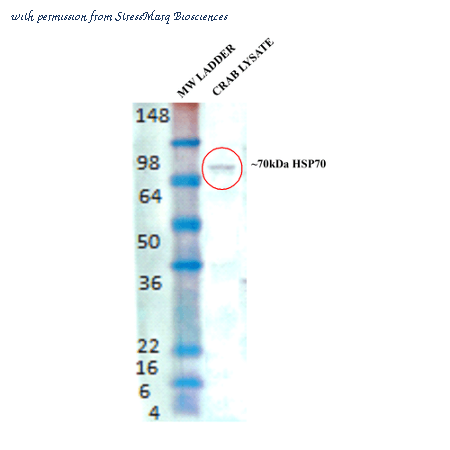product summary
Loading...
company name :
StressMarq Biosciences
product type :
antibody
product name :
HSP70 (Crab) Antibody
catalog :
SPC-318D
quantity :
100 µg
price :
300.00 USD
clonality :
polyclonal
host :
domestic rabbit
conjugate :
nonconjugated
application :
western blot
more info or order :
image
image 1 :

Western blot analysis of Crab Cell Lysate showing detection of HSP70 protein using Rabbit Anti-HSP70 Polyclonal Antibody (SPC-318). Primary Antibody: Rabbit Anti-HSP70 Polyclonal Antibody (SPC-318) at 1:1000.
product information
Catalog No :
SPC-318D
Product Name :
HSP70 (Crab) Antibody
Description :
Rabbit Anti-Crab HSP70 (Crab) Polyclonal
Target :
HSP70
Conjugate :
Unconjugated
2021 List Price :
300.00 USD
Currency :
USD
Research Area(s) :
Cancer Heat Shock Cell Signaling Protein Trafficking Chaperone Proteins Cancer Tumor Biomarkers
Alternative Name(s) :
HSP70 1 Antibody, HSP70 2 Antibody, HSP70.1 Antibody, HSP72 Antibody, HSPA1 Antibody, HSPA1A Antibody, HSPA1B Antibody
Size :
100 µg
Category :
Antibodies
Product Type :
Polyclonal
Immunogen :
Crab protein peptide: NDQGNRTTPSYVA, 100% identical to a wide variety of species including Mouse, Rat, Drosophilia, Rice, Arabidopsis, Bovine, Nematode, Bonobos.
Immunogen Species :
Crab
Accession Number :
AFX62578
Swiss-Prot :
B3VKG9
Applications :
WB
Host Species :
Rabbit
Species Reactivity Abbreviation :
Cr
Species Reactivity Full Name :
Crab
Antibody Dilution :
WB (1:1000); optimal dilutions for assays should be determined by the user.
Purification :
Protein A Purified
Storage Buffer :
1X PBS pH7.4, 50% glycerol, 0.09% sodium azide
Concentration :
1 mg/ml
Specificity :
Detects ~ 70kDa.
Storage Temperature :
-20ºC
Shipping Temperature :
Blue Ice or 4ºC
Cite this Product :
StressMarq Biosciences Cat# SPC-318D, RRID: AB_2704470
Certificate of Analysis :
1 µg/ml of SPC-318 was sufficient for detection of HSP70 in 20 µg of crab muscle lysate by colorimetric immunoblot analysis using Goat anti-rabbit IgG:HRP as the secondary antibody.
Cellular Localization :
Cytoplasm
Scientific Background :
HSP70 genes encode abundant heat-inducible 70-kDa HSPs (HSP70s). In most eukaryotes HSP70 genes exist as part of a multigene family. They are found in most cellular compartments of eukaryotes including nuclei, mitochondria, chloroplasts, the endoplasmic reticulum and the cytosol, as well as in bacteria. The genes show a high degree of conservation, having at least 5O% identity (1, 2). The N-terminal two thirds of HSP70s are more conserved than the C-terminal third. HSP70 binds ATP with high affinity and possesses a weak ATPase activity which can be stimulated by binding to unfolded proteins and synthetic peptides (3). When HSC70 (constitutively expressed) present in mammalian cells was truncated, ATP binding activity was found to reside in an N-terminal fragment of 44 kDa which lacked peptide binding capacity. Polypeptide binding ability therefore resided within the C-terminal half (4). The structure of this ATP-binding domain displays multiple features of nucleotide binding proteins (5). All HSP70s, regardless of location, bind proteins, particularly unfolded ones. The molecular chaperones of the HSP70 family recognize and bind to nascent polypeptide chains as well as partially folded intermediates of proteins preventing their aggregation and misfolding. The binding of ATP triggers a critical conformational change leading to the release of the bound substrate protein (6). The universal ability of HSP70s to undergo cycles of binding to and release from hydrophobic stretches of partially unfolded proteins determines their role in a great variety of vital intracellular functions such as protein synthesis, protein folding and oligomerization and protein transport. Looking for more information on HSP70? Visit our new HSP70 Scientific Resource Guide at http://www.HSP70.com.
References :
1. Welch W.J. and Suhan J.P. (1986) J.Cell Biol. 103: 2035-2050.
2. Boorstein W. R., Ziegelhoffer T. & Craig E. A. (1993) J. Mol. Evol. 38(1): 1-17.
3. Rothman J. (1989) Cell 59: 591 -601.
4. DeLuca-Flaherty et al. (1990) Cell 62: 875-887.
5. Bork P., Sander C. & Valencia A. (1992) Proc. Nut1 Acad. Sci. USA 89: 7290-7294.
6. Fink A.L. (1999) Physiol. Rev. 79: 425-449.
7. Hung T.H., et al. (2001) Am J Pathol. 159: 1031-1043.
8. Locke M. (2000) Cell Stress & Chaperones 5: 45-51.
9. Ianaro A., et al. (2001) FEBS Lett. 508: 61-66.
10. Trentin G.A. et al. (2001) J Biol Chem. 276: 13087-13095.
Field of Use :
Not for use in humans. Not for use in diagnostics or therapeutics. For in vitro research use only.
Image Filenames :
SPC-318_HSP70_Antibody_WB_Crab_Cell-Lysate_1.png
Image Alternative Text :
Rabbit Anti-HSP70 Antibody used in Western blot (WB) on Crab Cell Lysate (SPC-318)
more info or order :
company information

StressMarq Biosciences
PO Box 55036 CADBORO BAY
3825 Cadboro Bay Road
Victoria BC V8N 4G0
3825 Cadboro Bay Road
Victoria BC V8N 4G0
info@stressmarq.com
http://www.stressmarq.com1-250-294-9065
headquarters: canada
StressMarq Biosciences Inc. is a bioreagents company producing high-quality antibodies, antibody conjugates, proteins, assay kits, and small molecules for the life sciences.
With over 17,000 products, we offer a wide range of products for scientists in cancer, neuroscience, epigenetics, cell signalling, and cellular stress research areas.
Based in Victoria, BC, with a small but dedicated group of scientists, StressMarq provides highly-validated products that are sold with our quality guarantee, and supported by our years of scientific expertise. Our products are available in over 50 countries through our extensive distributor network.
StressMarq draws on scientific excellence from around the globe. We strive to partner with academic or for-profit institutions through licensing agreements to bring cutting-edge research tools to the scientific community.
With over 17,000 products, we offer a wide range of products for scientists in cancer, neuroscience, epigenetics, cell signalling, and cellular stress research areas.
Based in Victoria, BC, with a small but dedicated group of scientists, StressMarq provides highly-validated products that are sold with our quality guarantee, and supported by our years of scientific expertise. Our products are available in over 50 countries through our extensive distributor network.
StressMarq draws on scientific excellence from around the globe. We strive to partner with academic or for-profit institutions through licensing agreements to bring cutting-edge research tools to the scientific community.
browse more products
questions and comments
